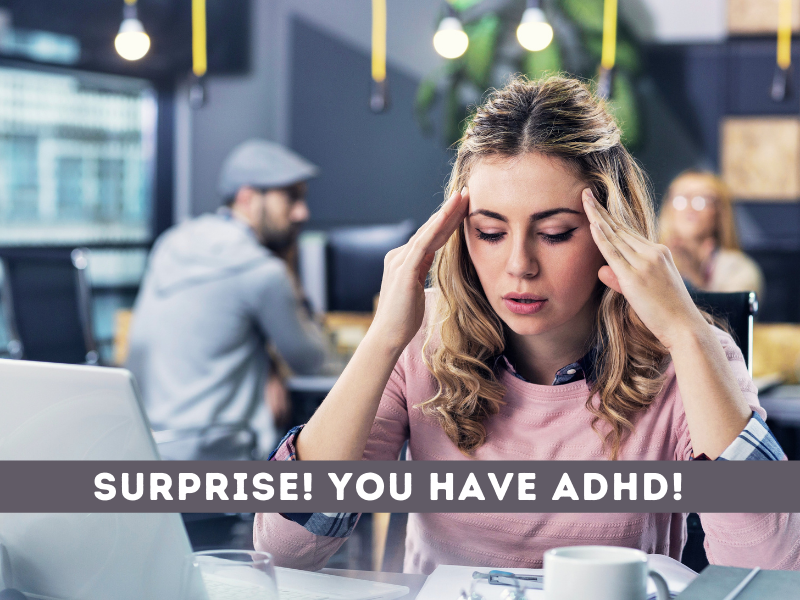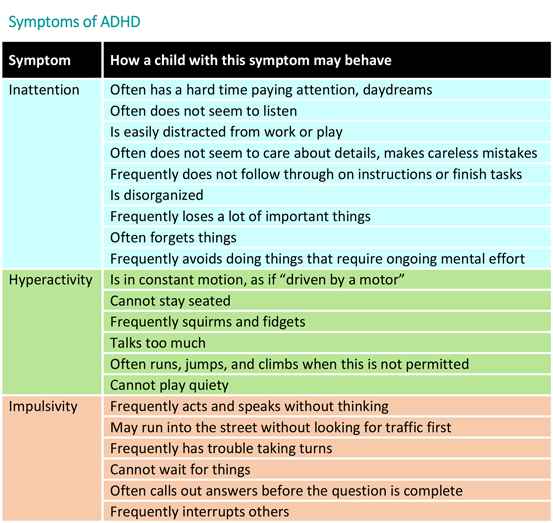How I, Mom of 3, Found Out I Have ADHD
“You bombed that test,” the psychologist reported, referencing a portion of my ADHD assessment.
I chuckled.
Not because bombing the test was funny but because I knew my performance on the attention-based test was laughable.
I wasn’t disappointed in the test results, though. On the contrary, getting an ADHD diagnosis today was what I was hoping for because it would finally help the past 40+ years of my life make sense.
Especially the last year of my life, the year best described as “the one with overwhelm.”
Was it anxiety? Was it depression? Was it something else that squarely put me in my chair for hours a day, unable to make myself do basic things like fix dinner or do the laundry? Yes, there was a pandemic, but this reaction was too much, too heavy.
I spent all available energy on keeping my business running – and trying to keep wraps on how I was really feeling. The only way I could seem to break through the mental fog and get any energy was by eating my way out of it – and you know that’s where my pandemic pounds came from.
The on and off symptoms of anxiety, depression, poor memory, and not “knowing who I was,” to name a few, were always there but grew outsized during the pandemic.
I am not a doctor. This article is not medical advice and is for informational purposes only. If you think you or your child may have ADHD, talk to your health care provider about getting tested or other options.
So when the psychologist stated, “I’m going to make a formal diagnosis of ADHD, combined-type,” it was music to my ears.
I had to sit on my hands as I listened to her present the reasoning behind the statement.
It was all I could do to focus on her words because I had a diagnosis!
Where some people might see a label with a stigma, I saw an opportunity- the ability to understand myself, access to medications, therapies, new support structures, and a community of others.
Where some people might see a label with a stigma, I saw an opportunity- the ability to understand myself, access to medications, therapies, new support structures, and a community of others.
Tweet
You’re Too Smart, Too Successful, to Have ADHD
Not once in my quest to understand myself did I think that I had ADHD.
I was in the top 10% of my high school class, I went to college, and I even got a master’s degree. I taught high school chemistry for ten years.
Clubs, groups, and activities were the norm for me. I loved being busy and I was great at coming up with ideas – and sometimes getting them done.
I was able to do school, score well on tests, and handle higher education. Apparently, you can do all of those things and still have ADHD.
Here’s what happened: back in the 80s when I was in school, ADHD was a diagnosis for hyperactive little boys. Since then, science has uncovered new information (remember when it used to be called ADD? They changed the name to ADHD because new research and new information warranted an update.)
Today, ADHD is regarded as a “brain disorder that affects how you pay attention, sit still, and control your behavior. It happens in children and teens and can continue into adulthood.”
I was able to do school, score well on tests, and handle higher education. Apparently, you can do all of those things and still have ADHD.
Tweet
ADHD stands for Attention-Deficit Hyperactivity Disorder.
It is a life-long condition that includes attention difficulty, hyperactivity, and impulsiveness. But you don’t have to be hyperactive on the outside to have ADHD. Often, it’s your brain that is hyperactive and that is invisible to those around you.

Everyone struggles with forgetfulness or mental hiccups at some point. What sets a typical person apart from a person with ADHD is that the negative life impacts are sustained for life. This is not a temporary situation for ADHDers.
ADHD is a neuro-processing difference that many people cannot overcome without medication or coaching.
You can be very intelligent and still have difficulty concentrating and juggling the mental details necessary for life in our society (skills known as executive function).
The Story Behind the Diagnosis
The pandemic did a number on our family and on me.
One of my kids floundered with virtual school to the point of not passing several classes.
We always knew that academics were a struggle for this kid, but the pandemic school year brought things to the forefront that previously had been missed.
All symptoms were pointing to the stereotypical ADHD traits – not turning in homework, difficulty concentrating, poor impulse control, impulsivity.
Our pediatrician recommended testing for ADHD. At that point, I decided to learn as much as I could about the disability. Podcasts, articles, books, and surprisingly, TikTok, became my new vehicles for information. (One trait of ADHDers is the tendency to do a deep dive – or hyperfocus – on things that interest them. It would be correct to say that’s what my ADHD research spree looked like.)
ADHD Can Be Passed Down From Parents
It was this research deep dive that led me to this detail: ADHD often runs in families. If that was the case, and my kid(s) had ADHD, there was a chance that I would also have the disability.
That discovery was the nudge I needed to talk to my doctor about my suspicions.
She heard me, agreed with me and put in an evaluation recommendation for me.
ADHD oftens runs in families.
Tweet
The Evaluation Process
My doctor referred me to Pine Rest in Grand Rapids. I’m sure different facilities follow different procedures for diagnosis. What follows is my personal experience.
Zoom Screening: 1 hour
My assessment started with a one-hour informal interview with the psychologist.
During that time, she asked me about why I wanted to be seen. (Overwhelm was a big concern for me.)
There were a lot of questions about my childhood and my symptoms back then.
We also talked about how I thought I was being impacted by ADHD right now.
Psychological Testing: 2 hours
I spent two hours with a clinician on a battery of tests that measured all sorts of things, including my effort level, general intelligence, memory, and ability to focus or react. It was intense and I’m glad it’s over.
Results: 30 minutes
This session was in person with the psychologist. She reviewed the testing with me, explained her findings, and presented me with a diagnosis. She offered resources, suggestions for next steps, and referred me back to my doctor for conversations about medication options if I was interested in that.
What Does ADHD Look Like in Adult Women?
As I peeled away the layers of my old ideas about ADHD, I learned that this diagnosis, once reserved for squirrely little boys, is now being claimed by more and more women in their 30-60s. And it’s not because adult women are getting late-onset ADHD (that’s not a thing.)
It’s because, the more science learns about ADHD, the more it’s being discovered in women. And, awareness is spreading among women.
ADHD manifests itself differently in women, oftentimes, and can be mistaken for depression, anxiety, or other diagnoses. The idea that I could have ADHD myself never crossed my mind until I was looking at it as a possibility for my child. That’s the case for many women.
Here’s where TikTok comes into the picture. I downloaded the app because my daughters were using it and I wanted to know what they were looking at/interested in. Little did I know that, when I made my own account and started interacting with the videos, the TikTok algorithm was learning about me. And since I was interested in ADHD content for my child’s sake, the algorithm kept serving me more and more of it.
At some point, though, the content stopped being about ADHD in children, from a parent’s point of view and started to be about ADHD in women. Specifically, women who were getting a later-in-life diagnosis. (I quickly recognized that I couldn’t trust every single video that was served up – be sure to do research to confirm what you’re hearing – but I did get a good idea of what ADHD in women could look like and a lot of it resonated with me.)
Side note – here are some of my favorite ADHD content creators on TikTok:
@catieosaurus
I don’t know how I ever got anything done before I discovered this ##adhdtipsandtricks ##adhdtiktok ##adhd ##learnontiktok ##tiktokpartner ##catieadhd
@lesleypsyd
The ##history of ##adhd. Part 1. ##neurodivergent
@chrink3
Are any of my fellow ##ADHD survivors exhausted of trying to hide their symptoms? ##adhdprobs ##adhdtiktok ##chrink3 ##mentalhealth
Some of the Ways I Now Realize ADHD has Affected Me
When you’ve lived with something for your whole life, it is normal for you.
I did not realize the extent that ADHD impacted my life until medication gave me a glimpse of another world.
Now, I can see clearly that ADHD was responsible for these things in my life:
- I was chronically overwhelmed. My mind is always racing and it is a jumble of simultaneous thoughts and ideas competing for attention.
- Sometimes I would stop speaking mid-sentence due to blanking out on the rest of the thought. Often, I will be speaking and not be able to recall a simple word for something and have to resort to stand-in descriptions for those items, like calling a spoon a water-stirrer-thingy.
- I lose or forget thoughts quickly unless I interrupt to tell you something right away.
- I procrastinate on little things that are boring until they become urgent. I used anxiety and adrenaline to get things done.
- There are piles of papers all over my office, sticky notes filled with to-do lists, because if something is not seen it is forgotten and won’t get done
- I manage time with multiple calendars and alarms – constantly gets absorbed in projects and loses all track of time. I also have built accountability into my work to help me stay on task.
- Making eye contact during conversations is hard because it is distracting and will cause me to lose my train of thought.
- Playing with my hair, tapping my foot, adjusting in my chair, playing with pens, biting the inside of my cheek, and zoning out when trying to concentrate or when thinking hard. I would regularly eat to get mentally “unstuck.”
Another thing I did was study the DSM-5’s criteria for an ADHD diagnosis.
(DSM-5 is the American Psychiatric Association’s Diagnostic and Statistical Manual, Fifth edition lists diagnostic criteria used by healthcare professionals when diagnosing.)
Here’s a list of DSM-5’s ADHD criteria, as well as a link to an Adult Self-Assessment Screener.
Neither tool is a substitute for a professional diagnosis, but each may help you determine if ADHD is a topic you’d like to discuss with your healthcare providers.
I had a strong hunch that I had ADHD, but I didn’t know for sure until I completed the diagnostic process.
How Has My Life Changed Since Getting the Diagnosis?
*I’m not a doctor and everything I’m writing here is not medical advice. This is my personal experience and a summary of what I’ve learned so far.
It’s been three weeks since my diagnosis and so much has already changed.
Having validation meant so much to me. I’ve suspected my whole life that I was different – more than just quirky. But I could never explain it and I thought I was depressed or had anxiety. It turns out it was ADHD in disguise. Viewing my past through this lens, now it makes so much sense.
The psychologist sent a report of her findings to my primary care physician the day after our appointment. At that point, I messaged my doctor via MyChart and mentioned that I was interested in trying ADHD medication. After a short exchange, she called in a prescription for low-dose Vyvanse. I picked up the prescription and started taking it the next day (pricey even with insurance!!)
I expected some side effects from the new medication. What I didn’t expect was the mental clarity and newfound ability to catch thoughts before I acted on them. Instead of all of the thoughts falling at once and creating overwhelm, I’m now able to hold them and evaluate before acting.
I’ve been on meds for about 3 weeks. It’s not all rosy but the change has been so positive, my quality of life so enhanced, that it seems like a gift. I can better keep my cool with the kids, I can better sit down and do boring but necessary things, and I generally feel happier because I’m not spending all of my energy handling low-level anxiety.
I never realized it, but life hacks have helped me live with ADHD.
I’ve developed systems to protect against my weaknesses. For example, I know that I will forget to take something to the mailbox unless it is in my path and I am literally going to step on it. So, I put outgoing mail on the floor in front of my office door.
File folders are where things go to die (out of sight out of mind is a reality for me) so I don’t use them. Instead, I organize projects on clipboards.
Accountability is a key factor in me getting boring things done. That’s why I set up systems where I have check-in dates with team members to keep me on track.
I’m still using all of these hacks and constantly trying to figure out more. Yes, the medication has helped but it will never take away the ADHD. This is something I have for life and coping strategies are a part of that.
How Has My Diagnosis Impacted Our Family?
Knowing about yourself can help you learn how to work with your challenges.
My kids are still on their diagnosis journey but knowing that I have it and that some of them likely have it, I am better able to understand their behaviors and recognize when it’s probably the ADHD talking.
Learning about ADHD has majorly impacted my parenting to the point that a lot of my beliefs have flipped upside down.
Productivity Expectations
Getting things done has always been a badge of honor in my family.
For the longest time, my husband and I thought that our child who struggles to be productive was just lazy and needed to try harder. Now I know that for ADHDers, laziness is a myth.
A lot of things happening internally – chemically in the brain – produce what appears to be laziness. I parent differently with this knowledge. I have more compassion. I use different strategies/systems. My language is more supportive. I’m sad to look back at how I parented previously and have apologized to my kids for those transgressions.
Conversation Etiquette and Eye Contact
“Sit up straight and look me in the eye when I’m talking to you.”
Immediate responses and eye contact are signs of respect in our society. I used to ask for this behavior from my kids because I thought they weren’t listening otherwise, and I wanted to teach them how to be respectful in social situations.
I’ve changed my tune with conversation etiquette in our home because now I know that eye contact can be a distraction, that playing a video game while talking together can be a good fidget outlet, and that we’re going to have a more authentic conversation this way.
I also have started leaving space for pauses in the conversation because I know that the ADHD brain can take a few seconds to catch up and formulate a response. It’s not that the kids aren’t listening or don’t care, it’s that their brains process conversations differently and operate on a different timetable.
I am still teaching the kids that eye contact and conversation in public with teachers, employers, coaches, etc will need to happen in the typical way, but I am providing space in our home for them to be themselves.
Celebrate Every Win
ADHDers are constantly forgetting things, not turning in work, and basically messing up. They get a ton of feedback telling them that they are lazy, stupid, and more. The constant drip of negative feedback seeps into their psyche and becomes a part of their internal monologue. Stress and anxiety are easy results here.
To combat this, my husband and I are on the lookout for opportunities to offer real praise. The kids would see right through any fake or syrupy “good jobs” – it’s got to be authentic. Little or big, we try to take any chance we get to build our kids up.
We Talk Openly About Our Brains & Challenges
There is still a stigma associated with ADHD in some places. Openly talking about it at home gives the kids a strong foundation and the language needed to refute bias when they bump into it in the world.
Knowing how we think and how our brains work will help my kids figure out how to navigate life better when they leave home. Talking about our challenges, their impacts, and discussing our options help them deal with our reality and become problem solvers.
Our Concept of Disability Has Expanded
Prior to my diagnosis, we hadn’t specifically discussed unseen disabilities as family.
It’s a good reminder that you can’t tell if a person is disabled just by looking at them. Many disabilities are invisible and people with disabilities have learned how to hide them to fit into society.
There are so many invisible disabilities. People with invisible disabilities have opinions and voices that are often overlooked or downplayed.
They are not often included at decision-making tables, even on topics that impact them. There are many capable adults with ADHD and autistic adults that would make great school board members, for example.
Doesn’t Everybody Have a Little ADHD?
Isn’t everyone a little scatter-brained or overwhelmed at times? Certainly.
Doesn’t that mean we’re all a little ADHD from time to time? Not at all. But that’s what a lot of people think – including me, just a year ago.
Now, due to my learning, I know that ADHD is a disability under the American’s with Disabilities Act (ADA).
Prior to that, I thought that it was just fine (and a little funny) to refer to my off-moments as little ADD blips. Pretty harmless, right?
While my comments were made innocently, they still contributed to something that ADHDers have been fighting for a long time: mainstream society not taking the diagnosis seriously. Saying we’re all a little ADHD infers that those diagnosed with ADHD don’t have an unmanageable problem and that they can get over it if they just try harder.
ADHD isn’t something that goes away with effort. It’s a real disability that impacts many lives daily.
Why Am I Sharing My Story?
Since day one, GRKIDS has been about helping people.
Helping parents, families in our community live better lives. Whether it’s finding fun things to do together, connecting people with health care providers, providing meaningful work for women in our community, or just giving people a place to fit in, that’s what we’re about.
If telling my story can help another mom or dad facing the same kind of overwhelm, it’s worth it.
Is it scary to tell the world that I’ve been diagnosed with a mental illness? 100%.
Are there people out there who don’t believe ADHD is real, or who might look down on me for taking medication? Yep.
I see the upside, though.
I have a platform that I can use to educate the community. I can help make the world a more knowledgeable, safer place for those with neurodivergent brains.
I can show people that ADHDers have the ability to do amazing things with their lives and that the old stereotypes need not apply.
Thank you for hearing my story, for accepting me as I am, and for joining me on this journey of learning. In no way do I claim to know everything about ADHD and I know we have some big hills yet to climb. That’s ok. I’m excited to use this new knowledge to help navigate the days and years ahead with my family.



:max_bytes(150000):strip_icc():format(webp)/diagnosis-of-adhd-20584_final-8e6972b8bcf444fb8beaa86b71200d5c.png)



You’ve inspired me for so many years. Thank you.
Thank you for sharing. As a mother of 3 with ADHD/1 with Autism, I’ve learned the stigmas and misconceptions are ever present. I never knew this would be my journey, as I’m sure someday other readers of yours will say.
Thank you for sharing your story!!!! I am certain that I am not the only Mom who said “WOW that sounds like me”…I need to talk to my Doctor! Thank you for being brave and open with something so private.